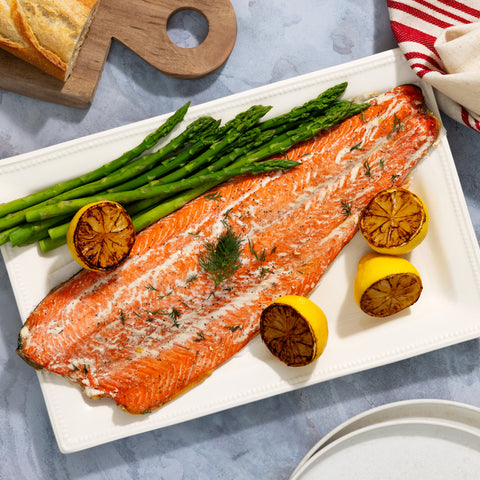Salmon is one of the most delicious forms of seafood available — perhaps nearly as good as lobster!
But figuring out how to make the best use of it for delicious home-cooked meals isn’t always easy. Which is the best type? And how should you cook it?
If you’re stumped by these questions, this guide has answers for you. It covers different cooking methods, the taste and texture of the meat, and where to find the healthiest salmon on the planet.
Why Choose Salmon?
Nutritional Benefits
One major reason to choose salmon is the health benefits it offers. This fish is a nutritional powerhouse, linked to lower disease risk and longer lifespans in traditional diets.
For example, salmon is rich in astaxanthin, the pigment that turns the meat pink. This carotenoid reduces LDL cholesterol, lowering the risk of heart disease and high blood pressure.
Salmon is also a top source of marine omega-3s — EPA and DHA — which fight inflammation and support heart and brain health.
Other key nutrients in salmon include:
- Vitamin D (supports bone health)
- Vitamin B12 (critical for nerve function)
- Selenium (essential for thyroid health)
- High-quality protein
Taste and Texture
Another reason to choose salmon is its flavor and texture. Many consider it one of the finest seafood choices.
Salmon is tender and slightly sweet with rich layers of flavor, especially when cooked lightly so the inside stays pink.
The taste can vary based on where the fish was caught and whether it’s wild or farmed. Fresh salmon is typically mild and buttery-sweet, but cooking methods also affect the flavor.
Its naturally high oil content helps it stay moist — making it a favorite for grilling and BBQs.
Cooking Methods
Salmon’s versatility means you can cook it almost any way you like. It doesn’t require complicated techniques to taste great.
Popular cooking methods include:
- Broiling — Broil at 500°F for 5–10 minutes, a few inches from the heat source.
- Poaching — Gently poach in broth at 185°F for up to 12 minutes.
- Sous vide — Cook sealed salmon in a water bath for 30–60 minutes.
- Grilling — Grill at 400–450°F for 3–5 minutes per side.
- Pan-frying — Fry in its natural oils with butter on medium heat for 3–5 minutes.
- Baking — Bake at 375–425°F for up to 20 minutes with herbs and spices.
Experiment with these methods — salmon is forgiving and easy to master if you follow a good recipe.
Sustainable Options
Choosing sustainable salmon can be tricky, but it’s possible. Organizations like Seafood Watch rate salmon sources using a green, yellow, and red traffic light system:
- Green — Best choice: responsibly caught or farmed with minimal environmental impact.
- Yellow — Good alternative: some risk but still acceptable.
- Red — Avoid: often unsustainable and environmentally damaging.
Most wild-caught U.S. salmon is green or yellow-rated. Wild Chinook from New Zealand, Atlantic salmon from the Faroe Islands and Maine, and coho from U.S. waters are also great picks. Avoid farmed salmon from Chile, Norway, and some Canadian regions unless they follow green-rated practices.
Healthiest Salmon
Wild-caught salmon is generally the healthiest choice. It’s naturally rich in astaxanthin, high in omega-3s, and low in contaminants. It also avoids antibiotics often found in lower-quality farmed fish.
Some farms — especially in New Zealand — maintain exceptional standards with clean water and careful practices. Sockeye and Chinook salmon are prized for high omega-3 content and nutrient density, with low mercury levels thanks to their pristine habitats.
Where to Buy
You can buy premium salmon directly from Maine Lobster Now. We offer sustainably caught options like Alaskan sockeye and Wester Ross. We also carry smoked salmon with a delicate, flavorful taste — all carefully prepared and shipped under strict quality standards.
Delicious Recipes

Here are a few recipe ideas to inspire your next meal:
Honey-Garlic Salmon
Try this quick, sticky Asian-inspired dish from Recipe Tin Eats. Soy sauce, honey, garlic, and vinegar create a flavorful glaze — ready in minutes.
Herb-Baked Salmon
This easy recipe from Downshiftology uses garlic, butter, lemon, and fresh parsley for a light, healthy dinner.
Hot Smoked Salmon Over Hash
Olive Magazine suggests combining leftover smoked salmon with potatoes in a tray bake for a satisfying meal.
Air-Fried Soy and Ginger Salmon
This quick option from the BBC uses sesame oil, honey, and chili for an easy, flavorful dish — pair with rice and veggies.
Salmon and Broccoli Pie
Try this hearty recipe from A Mummy Too. It’s a family-friendly way to use salmon and pantry staples for a filling meal.
Now You Know the Best Type of Salmon
With this guide, you’re ready to choose the best salmon for taste, health, and sustainability. Whether you prefer wild-caught or responsibly farmed, you’ll enjoy delicious, nutritious meals at home.




